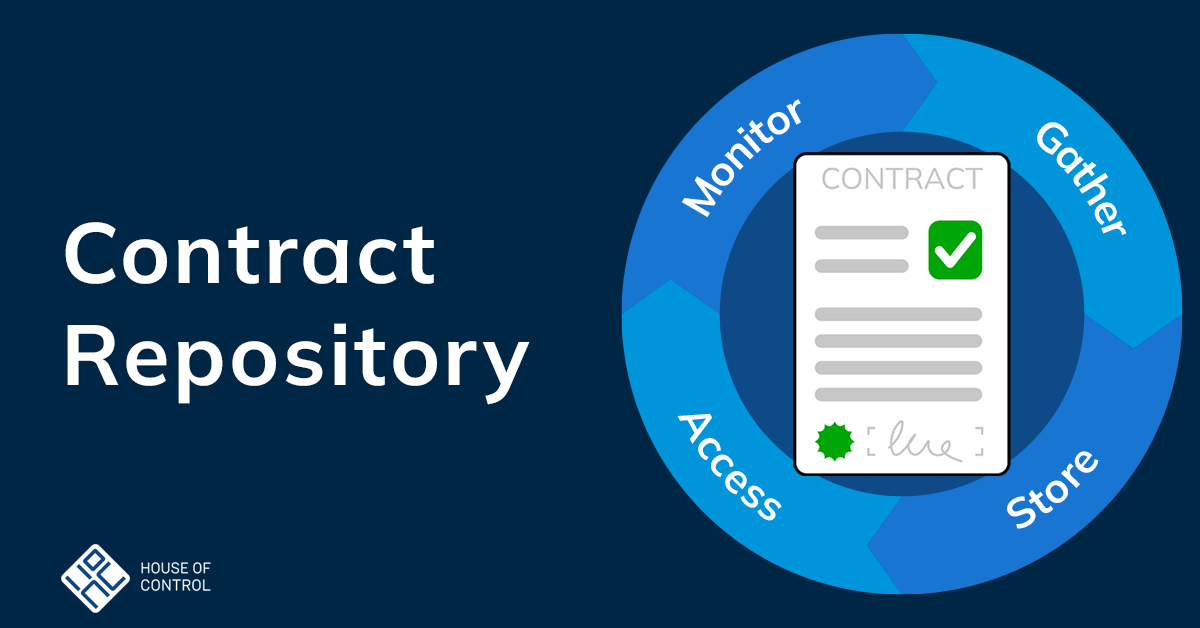Do you know where your business's contracts are stored? Are they spread across departments and locations? A contract repository could be the solution your team needs to find, store, organize, and access your entire contract portfolio.
In this post, we answer frequently asked questions about contract repositories and explain how they work.

1. What is a contract repository?
In its simplest form, a contract repository is a database that stores important information and serves as a ‘central source of truth’. It may contain digital contracts about the purchase or sale of any type of goods or services.
Businesses use contract registers to gather, store and manage all the contracts a company has with suppliers, customer or partners.
In the old days the contract repositories stored paper contracts and related documents. Now they stored scanned contracts, digital contracts (PDFs) , extensions and other related information.
The contract repository system usually stores files in the cloud and can be accessed via the internet or an app. Authorized users can upload a virtually unlimited number of files.
2. Why is a contract repository important?
There are often many people involved in negotiating, signing and managing contracts. In general, the larger the company, the more people are involved and the more complex the system becomes.
Contract managers, administrators, procurement, finance professionals and lawyers need accurate contract information to do their jobs effectively.
Without a central contract repository, they may not know a contract exists or they may spend hours searching for the right one.
Perhaps there are two overlapping contracts with the same supplier? Just imagine how difficult it can be if you are responsible for managing hundreds of contracts across multiple subsidiaries.
Poorly organized contracts leads to issues such as:
- Wasted time: Spent searching for contracts or gathering contracts for periodic reviews
- Inefficiency: Reading lengthy contract documents looking for specific details
- Uncertainty: don’t know whether the contract is correct version
- Duplications: entering new agreements with suppliers for existing products or services
- Unwanted renewals: contracts renew without proper review or negotiation
- Financial loss: do not manage or report contracted revenues, expenses and obligations correctly
3. What’s stored in the repository?
Contract repositories contain contracts. System users upload pdf versions of the contracts and add contract metadata. Metadata makes it easy for users to quickly find relevant information. For example, by searching and generating a list of all contracts that have renewal or termination date within the next month.
Some contract repositories will also allow users to add notes and images.
Basic data contained in a repository includes:
- Type of contract: Is signed with a supplier, a customer or another partner?
- Counterpart: Information about the company, important contacts and documentation (ISO, certificates and confirmations).
- Contract status: Is it active, inactive, under renegotiation or terminated?
- Department: Where in the business does the contract belong - level, location, cost center?
- Related contracts: For example, facility services and electricity connected to a particular office rent?
- Related assets: For example, what is the registration number of a leased car?
- Important dates: Signed date, start date, expiration, renewal and notice periods
- Payment plan: Cash flow in or out during the contract period.
- Category: Information for linking the contract to finance and accounting
- Responsible person: Who is the contract owner?
- Signature: Who signed the contract?
- Other: amendments, and extensions
4. What are the advantages and disadvantages of a CONTRACT repository?
One of the biggest benefits of a contract repository is that it speeds up contracting processes and give the organization better control. Anyone with access to the register (or specific sections of the register) can quickly find specific details when they are needed.
Some of the other advantages of a contract register are:
- Ensures access to contracts even when key personnel leave the company or are away sick
- Allows you to quickly search for contracts by keywords, phrases, dates, counterpart and other dimensions.
- Controlled access to contracts so only authorized people can view contract terms and conditions
- Confidence: that you are reviewing the correct version and you can look up when, who and where changes have been made
- Better control of renewals and terminations because you have registered renewal dates
- Some repositories enable you to track contract revenues or costs, simplifying work for finance and accounting teams.
- Less risk that of overlapping contracts or duplicates because you can quickly search the repository before entering new agreement.
There are few disadvantages to a central contract register. You will have to invest some time and resources to make sure it is set up to fit your requirements. And, like any database, it is important that the organization understands its value and is committed to keeping it updated and maintained.
5. How do you set up a contract repository?
Contract repositories come in many shapes and sizes. Many vendors offer a contract repository as one part of a complete contract management system. Contract management software offers additional features like contract templates, workflows and approvals, digital signature and notifications.
Unlike generic web portals or document storage, these systems are built specifically to support people and processes throughout the contract lifecycle. Most businesses must make a few adjustments to out-of-box solutions to meet their specific needs.
There are several factors to consider before choosing a solution, including the vendor's focus, reputation, product features, costs, and implementation processes. It should be easy for you to upload existing contracts into the software and define user access rights.
Ultimately, a contract repository will increase efficiency for almost every business.
You should set up a contract repository now if you have more than 30 contracts, or if the number is growing quickly. This will help you to avoid having too many contracts to deal with later.

 Gregory Gjini
Gregory Gjini